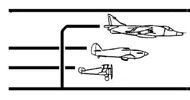| Name: | |
| Doug Shorey | |
| Transcript: 5 | |
| The 1965 round of cuts | |
In 1964, the incoming Labour Government of Harold Wilson came to power committeed to cutting defence spending and slimming down the aircraft industry. In 1965 the TSR-2 project was cancelled and in the same round of cuts also went Hawker’s P.1154. There was demoralisation in Britain’s aircraft industry and redundancies soon followed.It was about – it was soon after I joined the R and D Department – that Tommy Wake – this would be about, probably I would think 1962. Soon after I left the Lofting Department I heard he was going to retire. He would then have been about probably 64 or 65, and of course he had been 40 years at Hawkers. An on the day he retired – I just had to say goodbye to him because I had such a good relationship with him – and anyway I did speak to him and I shook his hand. And I said you know I was very sorry to see him go because I had always enjoyed our conversations about aircraft. You know in the interwar years and in the Second World War and after. And you name the aircraft and he had worked on pretty well all of them. You know the bi-planes, the Hurricane, the Tempest, the Typhoon. You name it, he had worked on them so he knew them all. A very knowledgeable – a very erudite man. And I remember saying to him, I envied his career because he had seen so much technical change in his working lifetime. And he said to me, something which I have never forgotten. He said, ‘Yes’, he said, ‘I think you are right, I probably had the best years of our aircraft industry.’ He said, ‘ And when you look at the way things are going’ he said, ‘It makes me wonder whether there will be any aircraft industry left when you reach my age.’ And how true that prophecy was because here we are today – I’m now older than Tommy was when he retired – I’m now 72. He was 65 at the time and what have we got left now as an aircraft industry, almost nothing by comparison to what we had. So he saw the future rather clearly. Yes, and as we moved into 1963 – I was due to get married in 1964 – and we wanted to set up home have a family as most couples do. And it looked as though, I mean, in the period around ’63, there was scandal in the government, the Profumo affair. Harold Macmillan was the Prime Minister and he wasn’t doing very well. And it looked pretty certain that the Tories weren’t going to get in at the next election which of course did subsequently take place in 1964 and it looked as though the Labour Party would get in. And, of course, they were talking about, just about scrapping every aircraft project on the drawing board. That was eleven fifty four [P.1154], which was a successor to the Harrier. The TSR2 – just to name two of them. And as time went on, as we got into early ’64, it became pretty evident to me that I probably wouldn’t have a future in the aircraft industry. I was very concerned about it. And at the time, when I first joined Hawkers although I didn’t really give much thought, I couldn’t really see myself working anywhere else. I was going to be working in the aircraft industry for the rest of my working life. But I started to have grave misgivings about whether I would have a future. And as I was going to get married in 1964 I decided that perhaps I ought to look elsewhere. I wanted to stay in the aircraft industry but I really couldn’t see much future. De Havillands was a possibility because they were into civil aircraft but in some way civil aircraft didn’t have the appeal that military aircraft had. I had never been interested in civil – in military – in civil aircraft – still not, actually. It was always military aircraft I was interested in, and have been. So I decided that I didn’t have a future in the aircraft industry. And I decided to leave and I actually left in 1964. And with the benefit of hindsight I think it was the right decision because the eleven fifty four was scrapped. Harold Wilson and his ‘merry men’ came to power – I think it was around about February or March 1964, it was in the spring. And of course they started going through everything, cancelling everything. And I think the following year, 1965, there was quite a big redundancy at Hawkers. And while there was no guarantee… Had you already left by then? I had already left by then but while there was no guarantee that I would have been made redundant, I didn’t give much for my chances because my knowledge was so limited. Yes, I knew a lot, but looking at people that were far more important to the company, far more senior people that they couldn’t afford to get rid of, they would get rid of people that would do the least amount of damage to the business. So that didn’t give much for my chances. So I think with the benefit of hindsight I did take the right decision. Although I was very sorry to do so at the time, because Hawkers were such a superb company to work for.
|
|


